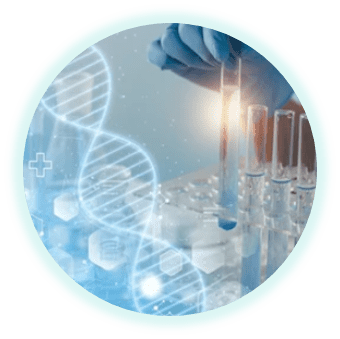Affinity-based DELs selection has some shortcomings. For example, DNA tags may hinder the interaction of DELs members with target proteins, affecting the identification of some potential candidates. In addition, although target protein binders can be selected, there is no guarantee that these binders are biologically active. Therefore, biochemical selection has emerged and become a new idea for DELs selection.
Alfa Chemistry has been focusing on the development and innovation of DELs technology for 20 years. We have built a complete DELs platform to help researchers and scientists discover small molecule ligands against various target proteins, aiming to accelerate the discovery of innovative drugs. Alfa Chemistry has the ability to provide biochemical DELs selection services with one-bead-one-compound (OBOC) DELs against soluble targets.

Advantages of Biochemical Selection
Biochemical selection with a beads-immobilized library (OBOC-DELs) provides an alternative to affinity-based DELs selection. The release of OBOC small-molecule moieties from their beads allows the compound to fully interact with the target without interference from a covalently attached DNA barcode. This innovative selection strategy opens up new possibilities for biochemical detection, fully demonstrating the great potential of DELs for screening active drugs. It has the following advantages [1].

- It has very low requirements on the content of the target protein, and even requires that the ligand must be in excess of the protein.
- It may not focus on protein purity.
- It is easier to perform in complex systems.
- It can be used for direct assaying of biochemically active hit molecules.
- It mainly relies on the OBOC platform, using droplets to create independent incubation environments, so that compounds are not restricted and affected by DNA tags, and can interact freely with targets to fully exert their activity.
Selection Strategy
Today, OBOC-DELs are more than just a simple coupling of early OBOC with DNA encoding, but possesses multifunctional linkers, a low DNA/compound ratio, as well as a photo-cleavable linker, making it suitable for biochemical selection, such as identifying enzyme inhibitors. Combining it with microfluidic technology and fluorescence technology for biochemical and cellular selection provides new possibilities [1, 2].
Alfa Chemistry provides biochemical selection strategies based on OBOC-DELs, which combines microfluidic technology and fluorescence polarization (FP) strategies to provide researchers with satisfactory biochemical selection services.
Selection Process
The DELs selection strategy that combines microfluidic technology and FP has the ability to be extended to nucleic acid-binding proteins, and proteins that are difficult to overexpress and purify. The entire selection process takes place in a custom microfluidic chip, as shown below [2].
- Construct the DELs, and the DELs member consists of a bead labeled with a DNA barcode and a small-molecule moiety connected to the bead via a photolabile linker. Then wrap DELs beads in water-in-oil droplets.
- Efficiently disperse these library beads into the microfluidic chip using droplet microfluidics.
- Target proteins and self-quenching substrates are co-encapsulated within custom-made microfluidic chips. Upon binding to the protein, the substrate breaks down and emits fluorescence, which triggers a photocleavage reaction to release the compound from the beads.
- Ligand selection is performed by detection and analysis of laser-induced fluorescence polarization (LIFP) within droplets.
- Perform DNA amplification and sequencing after collecting beads.
Choose Us
Alfa Chemistry has a complete DELs platform on which we can design DELs according to customer requirements and provide selection services for the desired targets. As we continue to explore new biochemical selection strategies, you can trust us to provide you with the best biochemical selection services. Please feel free to contact us with any concerns.

Professional research team

Complete DELs platform

Extensive experimental experience

Strict quality control system
References
- Huang, Y.; Li, X. Recent advances on the selection methods of DNA encoded libraries. ChemBioChem. 2021, 22(14): 2384-2397.
- Satz, A. L.; et al. Selections and screenings of DNA-encoded chemical libraries against enzyme and cellular targets. Bioorganic & Medicinal Chemistry Letters. 2021, 39: 127851.
